If your dog has eaten melatonin, it can be a serious situation that requires quick action. Knowing what to do next can make a big difference in your pet’s health and safety. Many dog owners may not realize the potential effects melatonin can have on their furry friends.
In this article, you will learn the four emergency steps to take if your dog consumes melatonin.
By following these steps, you can help ensure your dog gets the care they need.
Understanding the importance of immediate action is key to handling this kind of emergency effectively.
1) Check Dosage Guidelines
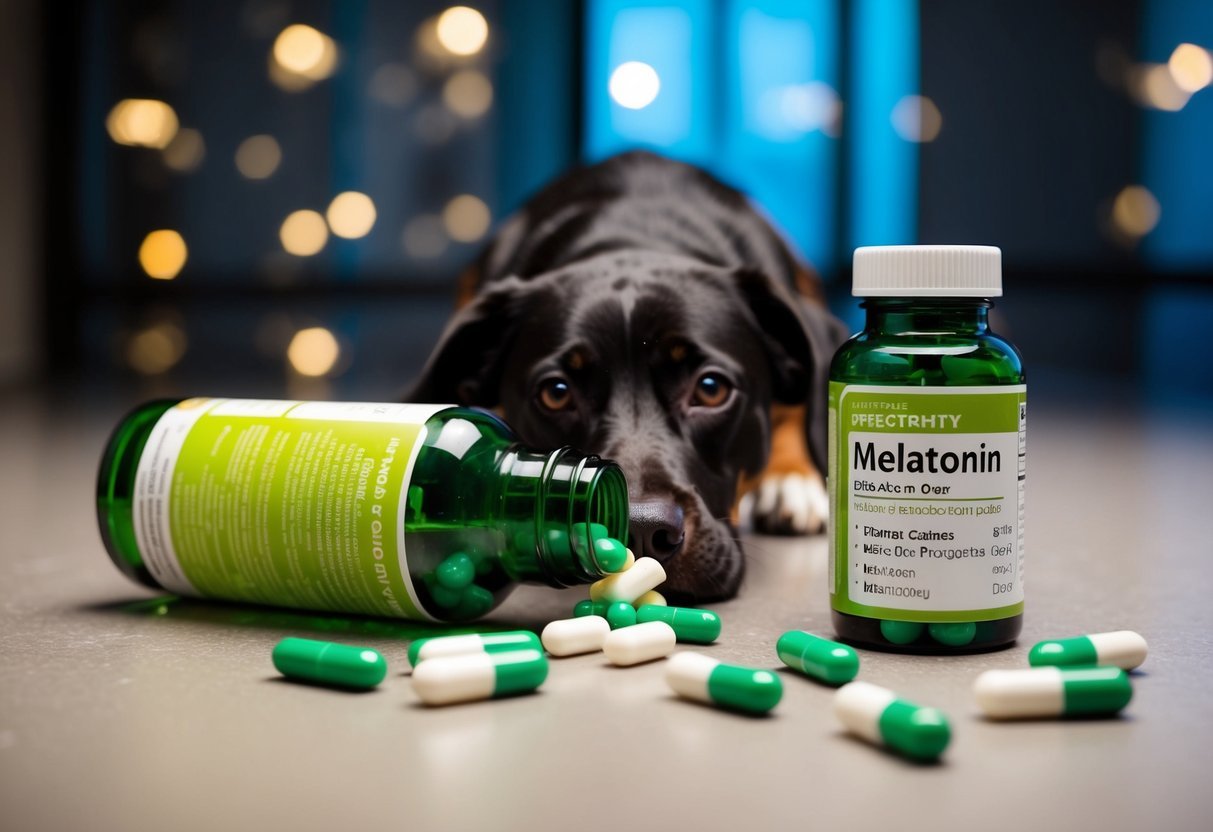
First, find the melatonin bottle and check the dosage guidelines.
The amount that is safe for dogs can vary based on their size and health.
Make sure you know how much your dog might have eaten.
If it’s more than the recommended dose, this could be a problem.
It’s also important to look for other ingredients in the melatonin.
Some brands include xylitol, which is toxic to dogs.
If you have any doubts, reach out to your vet right away.
They can help you understand what to do next based on the dosage your dog may have consumed.
Knowing the right dosage is key to keeping your furry friend safe.
Stay calm and act quickly!
2) Contact Your Vet Immediately
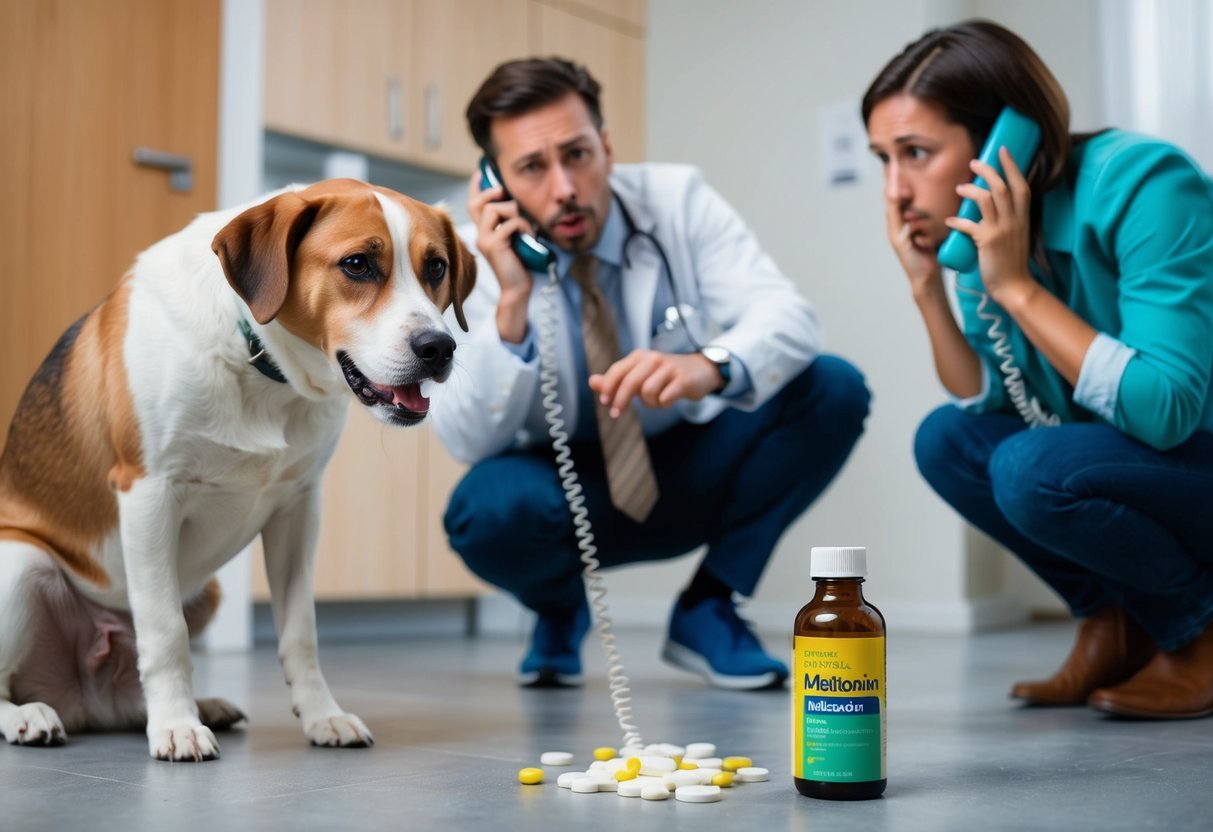
If your dog eats melatonin, the first thing you need to do is contact your vet.
Don’t wait to see if there are symptoms.
Time is important.
When you call, provide details like your dog’s weight and age.
This helps your vet understand the situation better.
Even if your dog seems fine, it’s essential to get advice.
Some dogs may not show signs of trouble right away.
Monitoring them closely is key.
If the vet suggests bringing your dog in, do it right away.
They may need to check for any reactions or provide treatment.
You can also call a pet poison control hotline.
They have experts who can give you detailed guidance.
Always keep melatonin and other medications out of your dog’s reach.
Being proactive can prevent serious issues in the future.
Monitor Your Dog’s Behavior
Keep a close eye on your dog after they eat melatonin.
This helps you notice any changes that might signal a problem.
Look for signs like disorientation or confusion.
If your dog seems lost or unsure of their surroundings, it could be a reaction to the melatonin.
Watch for excessive drowsiness, as melatonin is a sleep aid.
Your dog might sleep more than usual, which is expected.
Keep track of how your dog acts.
Are they still able to play or respond to you? If they seem unresponsive, it’s time to call a vet.
Monitor for any unusual behavior.
If your dog shows signs of distress, like whining or pacing, take action.
Documenting these changes can help your vet understand the situation better.
Write down what your dog did and how long it lasted.
Being vigilant can make a difference in your dog’s health.
Your quick response could help address any issues early on.
4) Avoid Giving More Melatonin
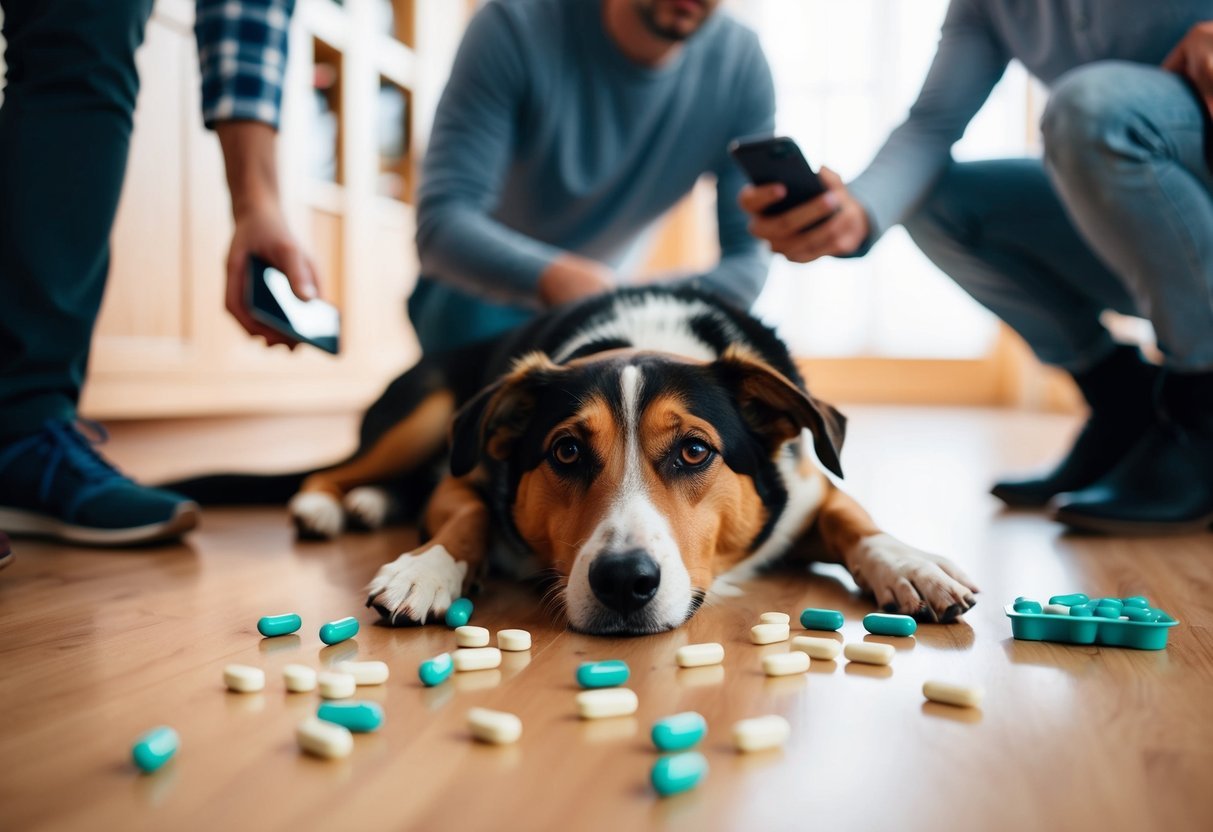
If your dog accidentally eats melatonin, stop giving any additional doses.
This is important to prevent any overdose.
Melatonin can be safe in small amounts, but more is not always better.
Too much can lead to serious health issues.
After your dog ingests melatonin, watch for any signs of distress.
These could include lethargy, vomiting, or changes in behavior.
If you notice these, contact your vet right away.
Always keep melatonin and other medications out of reach.
This helps to prevent future accidents.
Remember, your vet is the best person to guide you on what to do next.
They can provide the right advice based on how much your dog has eaten.
Understanding Melatonin And Dogs
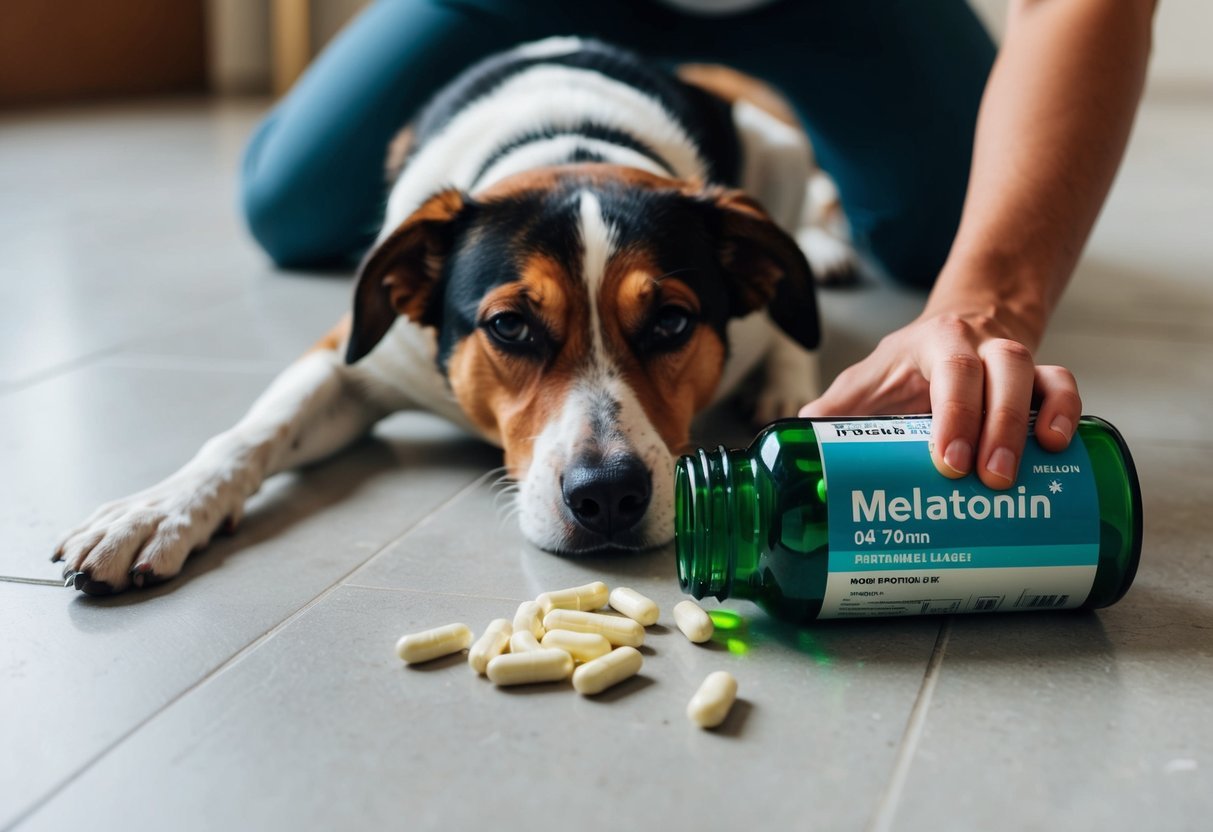
Melatonin is a hormone that can affect your dog’s sleep patterns.
It’s important to know what melatonin is and how it works in your dog’s body, especially if they’ve accidentally ingested it.
What Is Melatonin?
Melatonin is a naturally occurring hormone produced by the pineal gland in the brain.
It helps regulate the sleep-wake cycle in both humans and animals.
In dogs, melatonin is often used as a supplement to help with anxiety or sleep problems.
Melatonin supplements are usually available in various forms, including tablets, chewables, and liquids.
The dosage can vary based on your dog’s size and health needs.
Always check the label to ensure the product is safe for your dog and does not contain harmful additives.
Be cautious with dosages, as too much melatonin can lead to side effects like lethargy, disorientation, or digestive issues.
If you’re considering giving melatonin to your dog, it’s best to consult with your veterinarian first.
How Melatonin Affects Dogs
When a dog ingests melatonin, its effects can start showing within 20 to 30 minutes.
Melatonin works by mimicking the natural hormone in your dog’s body, promoting relaxation and sleepiness.
For most dogs, small doses are generally safe.
However, larger amounts can lead to an overdose, resulting in symptoms like vomiting, tremors, or difficulty breathing.
If your dog shows any of these signs, it’s crucial to seek veterinary help immediately.
Additionally, certain ingredients in melatonin products, like xylitol, can be toxic to dogs.
Always read labels carefully.
This can help to prevent accidental poisoning and ensure your dog’s health and safety.
Immediate Actions To Take
If your dog has eaten melatonin, it’s important to act quickly.
Follow these steps to help your furry friend:
-
Stay Calm
Panicking won’t help. Take a deep breath and focus on what you need to do next. -
Check the Label
Look at the melatonin bottle to find the dosage. This helps the vet understand how much your dog consumed. -
Monitor Your Dog
Watch for any signs of overdose, such as disorientation or confusion. Symptoms typically show up within 20-30 minutes. -
Contact Your Vet
Call your veterinarian right away. They can provide specific advice based on your dog’s size and health. If you can, provide them with details about the melatonin. -
Do Not Induce Vomiting
Avoid the urge to make your dog vomit at home unless your vet instructs you to do so. It can be risky. -
Seek Immediate Help If Needed
If your dog ate a whole bottle, reach out to a pet poison control hotline or bring your dog to the vet immediately. Quick action can make a big difference.
Being prepared and knowing what to do can help keep your dog safe.
Identifying Symptoms Of Melatonin Ingestion
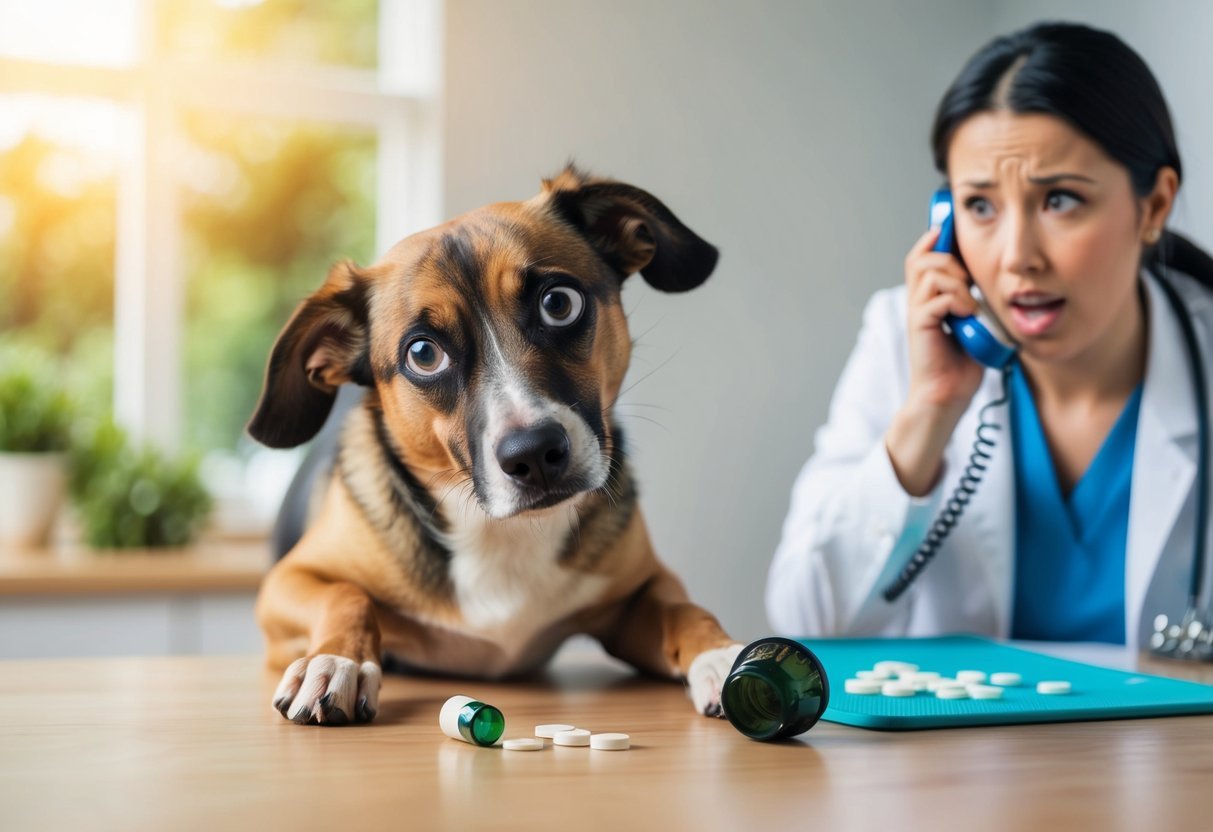
If your dog accidentally ingests melatonin, it’s important to recognize the symptoms.
These can vary from mild to severe, depending on the amount consumed and your dog’s size.
Mild Reactions
In many cases, your dog might show mild reactions after ingesting melatonin.
The most common symptoms include:
- Lethargy: Your dog may seem unusually tired or less active than usual.
- Excessive Sleepiness: If your pet is sleeping more than they typically do, this may be a sign.
- Mild Gastrointestinal Upset: Look out for vomiting or diarrhea, although these should be minor.
These symptoms may start showing 20 to 30 minutes after ingestion.
While they can be concerning, they are often not life-threatening.
Still, it’s good to monitor your dog closely to ensure the symptoms don’t worsen.
Severe Reactions
In some cases, melatonin ingestion can lead to more serious issues.
If your dog shows any of the following symptoms, contact your vet immediately:
- Rapid Heartbeat: If you notice your dog’s heart racing, it could indicate a serious problem.
- Tremors or Seizures: These are alarming symptoms that require urgent medical attention.
- Difficulty Breathing: Watch for any signs of distress while breathing, which is critical.
- Hypoglycemia: Symptoms like weakness or unresponsiveness can mean low blood sugar levels.
Recognizing these severe reactions quickly can be crucial for your dog’s health.
Always err on the side of caution and contact a veterinarian if you observe these signs.
Frequently Asked Questions
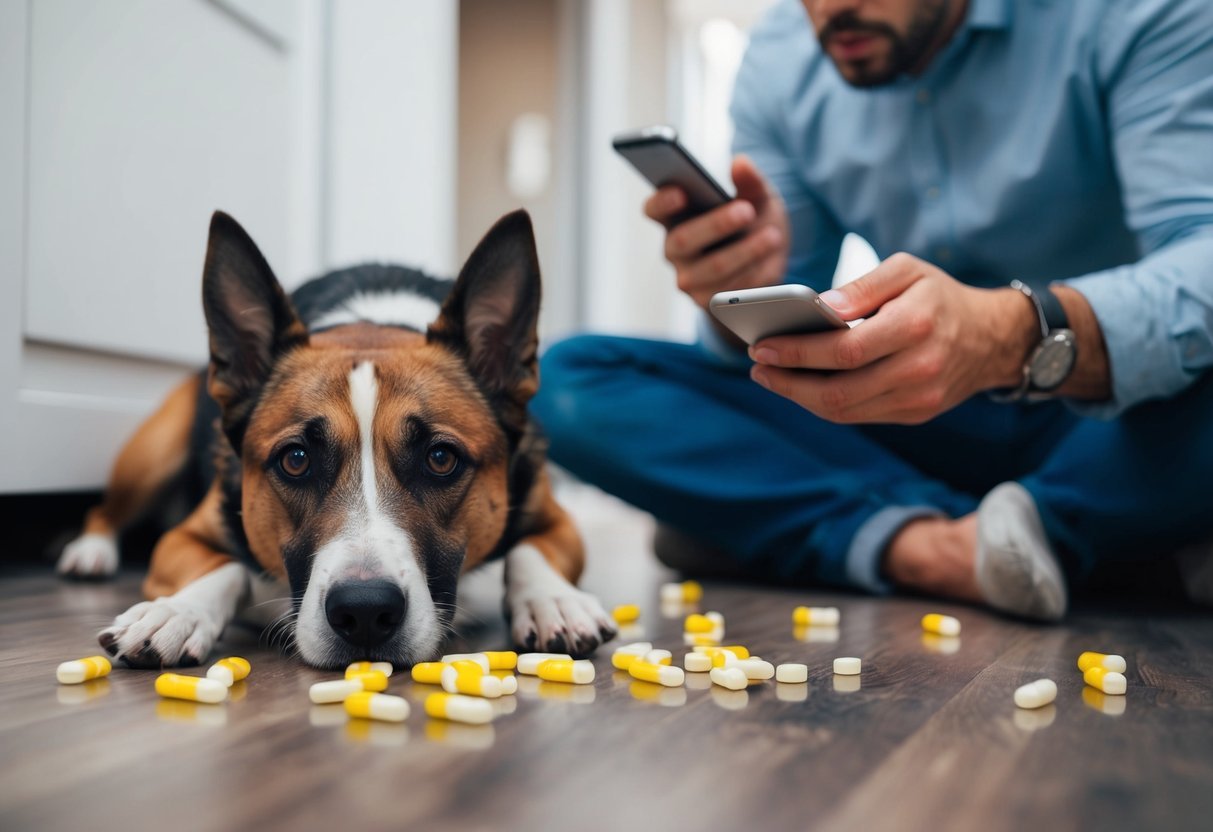
If your dog has eaten melatonin, you probably have some urgent questions.
It’s important to know what steps to take and what signs to watch for in your dog.
Here are some common queries that can help you navigate this situation.
What should I do immediately if my dog snags some melatonin?
First, check how much melatonin your dog may have eaten.
Then, contact your veterinarian as soon as possible.
They can provide you with specific advice based on your dog’s size and health.
Can a dog have an overdose from too much melatonin, and what are the signs?
Yes, dogs can overdose on melatonin.
Signs of an overdose include disorientation, drowsiness, and upset stomach.
If you notice these symptoms, seek veterinary help right away.
How long will it take for melatonin to clear out of my dog’s system?
Melatonin generally clears from a dog’s system within a few hours.
However, this can vary based on how much was ingested.
Always monitor your dog closely during this time.
Are there any symptoms I should watch for if my pup ate melatonin?
Watch for symptoms like lethargy, confusion, or digestive issues.
If these symptoms appear, it’s best to consult your vet.
Quick action is key to keeping your dog safe.
Could melatonin make my dog’s tummy upset?
Yes, melatonin can cause gastrointestinal issues in some dogs.
If your pup shows signs like vomiting or diarrhea, contact your vet for advice.
They can guide you on the next steps.
Is there a specific dose of melatonin considered safe for dogs based on their weight?
The safe dose often depends on your dog’s weight and needs.
Generally, small dogs might need around 1 mg, while larger dogs can safely take 3-6 mg.
Always check with your vet for the right dose for your dog.

